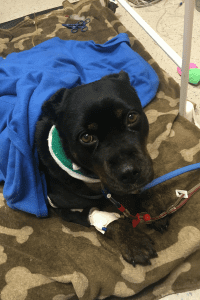 A Chicago dog that competes in the Elite Division of the National Association of Canine Scent Work is back on the field thanks to life-saving hemodialysis treatments at Veterinary Specialty Center (VSC) in Buffalo Grove. Greta became ill in November after a competition and arrived at VSC in critical condition in acute kidney failure due to Leptospirosis.
A Chicago dog that competes in the Elite Division of the National Association of Canine Scent Work is back on the field thanks to life-saving hemodialysis treatments at Veterinary Specialty Center (VSC) in Buffalo Grove. Greta became ill in November after a competition and arrived at VSC in critical condition in acute kidney failure due to Leptospirosis.
“She never gets sick and we were at a competition in Southern Illinois when she started to vomit and within an hour and a half, she was very sick,” says Greta’s owner Cynthia Buczko. “We were able to find a veterinarian in Macomb that could examine her on a Sunday. She was already in acute kidney failure and that veterinarian knew that VSC offered hemodialysis and sent us there.”
Veterinary Specialty Center is one of just ten private veterinary practices in the country and the only practice in the Midwest to offer hemodialysis. Unlike people, pets generally do not go on dialysis for life but receive dialysis until they are able to make urine and their kidney values stabilize. Greta was to undergo around eight treatments but showed immediate improvement early on.
“Greta did well with her first therapy and made some clinical improvement, but her kidneys were still severely injured and a second treatment was performed,” said Seth Ghantous, DVM, DACVIM, one of two internists that worked on the dialysis case. “Her kidney values were still high after the second treatment, but she was able to make adequate volumes of urine. This indicated that her kidneys had recovered enough to no longer need hemodialysis. She was then managed in a traditional manner for a Leptospirosis case.”
At that time, Greta went home where Buczko, a critical care technician, closely monitored her progress every few hours. Although the first few days were difficult, Greta rebounded and was doing much better by the fourth day. Within days her kidney values had stabilized.
“Greta’s case is a great example of how hemodialysis can be used in veterinary medicine,” added Ghantous. “She was diagnosed with a very survivable disease – Leptospirosis. However, she likely would not have survived without hemodialysis as her kidneys were injured so badly that she was not producing urine. Leptospirosis will often respond to antibiotics but it does require time. Hemodialysis provided Greta the extra time she needed to respond and recover. Had Greta’s kidneys not been able to produce urine after the second treatment, she could have received several more so she had more time to respond to her medications.”
Both dogs and cats can benefit from hemodialysis and it can be used to provide time for kidney recovery in more than just infections with Leptospira. Acute injuries from traditional kidney infections and obstruction of the kidneys with stones may be helped by dialysis. Injuries that can create low blood pressure and injure the kidneys like shock, hemorrhage, sepsis, anesthesia, and acute injury from toxins such as lilies, grapes, NSAIDs, and antifreeze are all potential conditions that hemodialysis could help. It can provide a bridge to renal recovery when animals are thought to have a kidney injury that they can recover from if given more time.
 VSC has been offering hemodialysis for five years and was the first veterinary practice to offer the procedure. Jerry Thornhill, DVM, DACVIM, has been leading VSC’s Dialysis Department since its inception and also worked on Greta’s case with Dr. Ghantous.
VSC has been offering hemodialysis for five years and was the first veterinary practice to offer the procedure. Jerry Thornhill, DVM, DACVIM, has been leading VSC’s Dialysis Department since its inception and also worked on Greta’s case with Dr. Ghantous.
Greta had her best-ever competition in November when she wrapped up her season. Buzcko believes that Greta had been exposed to Leptospirosis at an earlier competition in New Hampshire. Greta had a snap test for Leptospirosis that came back negative prior to her arrival at VSC. She was diagnosed with Leptospirosis after more extensive blood work was done in Buffalo Grove.
“When we arrived at VSC, it was so grim. I took her for a walk and had her do a search using her nose work skills at VSC, just in case it was her last,” says Buczko. “Her recovery has been remarkable. She is not only back on the competitive circuit, but she is also back into getting into lots of trouble at home.”
Accidents and illnesses do happen to pets, even when you follow pet safety tips. Veterinary Specialty Center’s Emergency and Critical Care Department is open 24-hours a day, 365 days a year. Our 24-hour emergency facility is located at 2051 Waukegan Road in Bannockburn and we can be reached at 847.459.7535. If you’re coming into our emergency room, it does help to call in advance if possible or get in line online for non-urgent cases.
